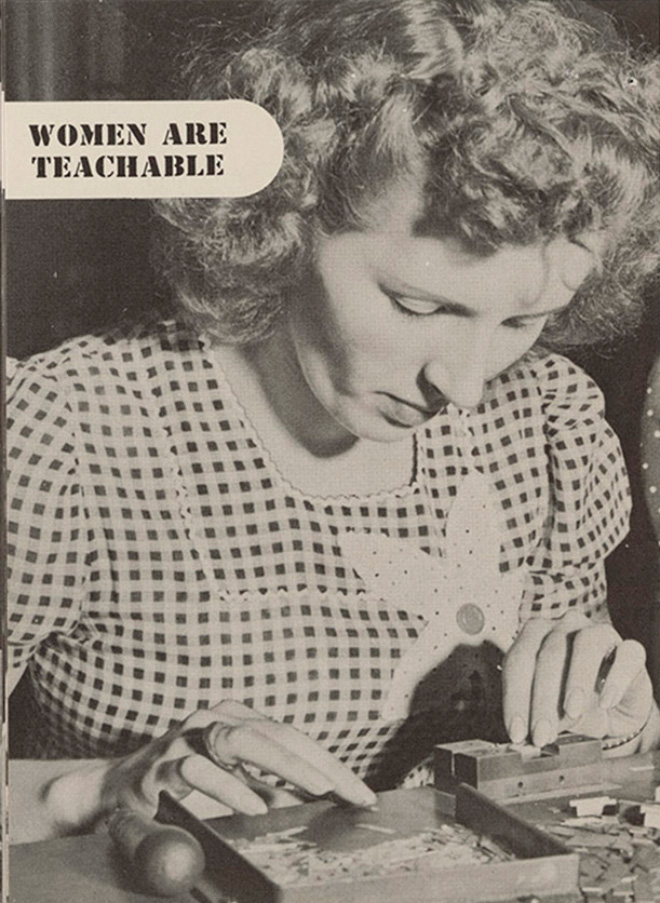In this 1940s guide for how male bosses should treat female employees, men were amusingly told that “women are teachable”. The booklet shows just how much the work place has changed since World War II era.







If you enjoyed this post, you may also like Tips For Single Ladies (1938), How To Get a Husband (1958), and Vintage Food Industry Beauty Queens.




How is this any different than today?
I think that a lot of employers nowadays could learn a lot from this
Actually, that’s a great guide for employers to treat ANYONE, not just women.
If you can get past the “OMG, they were so backwards,” and being offended and listening through a tone-filter of the intervening 80 years, and click through and actually read the bullet points on the four pages, nearly everything there is excellent management advice for ANY supervisor of ANY employee in ANY workplace.
[I think it may be too much to expect folks to think about war-ravaged Britain in 1940 bringing an entire population into the industrial workforce that had never been there before, a trying to do so without killing a lot of them or introducing inefficiencies into defense production that would result in an existential threat to the entire nation. But that’d be nice.]
Seems like good advice for *any* employee…
I don’t know about this. Just thinking about my wife, the “trainable” part just hasn’t worked. I suspect it may have backfired, but I just don’t know. Anyway, I have to go vacuum, mop the floors and freshen up before she gets home from her weekly poker game.
I do like the advice to not engage in horseplay or kidding.
Yes, things have changed…you’d be very lucky to find a supervisor who followed such sensible advice.
A little patronising but it could apply to all employees of either (all) sex.
Hell. I want to work there.
Some very good point there, it is the attitude and method of presenting them , i am sure there are some who wish they had been provided that much info for thier job assignment. Times have changed some…
They did a fine job of building the airplanes that were used in WW 2.
These women look like pictures of my mom who got her first job in 1940 in the Employment Office of NCR. She was ecstatic — she went into apply for any job they had right out of high school and they liked her so much they hired her in their personnel office! I still have a picture of her at her desk that was published in the local newspaper, for some reason. She would have loved seeing this booklet!
How wonderful is this.
With the possible exception of the title, this is appropriate in every way.
All good ideas except to place them with others with similar interests. They’ll be chattering away as women are wont to do.
I wish I worked in this kind of a workplace.
How about freaking paying her the same as men?!
Good advice for treatment of ANY employee regardless of gender
So…Many…Anonymous
Ahhh, those were the days
Only the title is patronising, the actual advice is extremely good. If only all employees were treated so considerately.
This is right up there with my copy of a 1950’s copy of a pay schedule for teachers! One side for males the other side for females( who are compensated about $2,000 LESS) for the same duties!
This is just normal, sensible advice… not sure why this is supposed to be funny!
Every day accommodations that are somewhat lacking in today’s workforce. You could replace the pronoun with “employee” and it would be fine.
I would like to see the one for men.
This is so much better than the conditions that we work in today, and amount of criticism, and lack of any consideration to health, monthly and otherwise; and family situation. Thesr “old rules” should be implemented today!
The title may be patronizing, but the advice is respectful and conducive to a good workplace! If only things were this good for (all) employees these days.
If only my employer had followed those rules when I started working, I would have: 1. Been paid as much as the male employees. 2. Not been sexually harassed. 3. Much more.
That sounds like the ideal work environment for everyone, not just women.
I am echoing several others in saying this would be good general advice to follow for ALL employees, I also am looking at it from the employee perspective, and prefacing each with “the right to.” It works.
If you drop the word “woman” these guidelines are pertinent today for all workers in all fields, regardless of sex, age, creed, etc.
Can we honestly say that the employment of women actually improved the conditions for everyone?
I doubt if it was Britain, by the spelling, but it was wartime and women were being drafted into jobs previously done by men. It is patronising but perhaps understandably
It’s sexist and paternalistic as Hell, but there is some humanity which bleeds through which employers of all eras could benefit from. “No horseplay or ‘kidding’ – she may resent it.” In other words, no sexual harassment! It’s not hard.
I was thinking of where I can hang this for the family to see :) :) :)